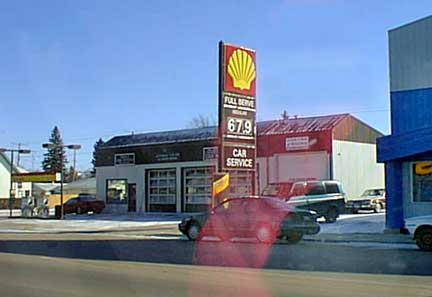
The Price Is Right!
FTLComm - Tisdale
March 8, 2000
Gasoline prices have settled at 72.9 in Regina and on the weekend Saskatoon stations
were charging 69.5. Though it is a little hard to explain several locations in Tisdale
and Melfort have dropped their price from 68.9 to 67.9.
Both Wicks and Tisdale Service (Shell) have the bargain priced fuel
while Esso, Seven-11, and FastGas are all still at 68.9. Co-op
and Petro Canada are also at 68.9.
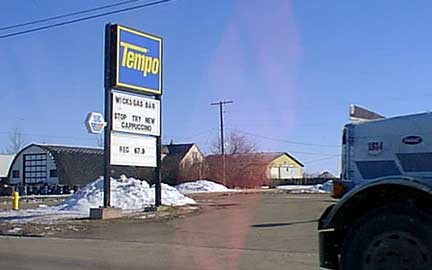
Fuel prices are essential developed using "restaurant math", (Douglas Adams of the Hitch Hikers Guide to the Universe developed the idea of restaurant math) which means that the price is not based on cost of production, supply or even demand but instead on the price that consumers are willing to pay. The 1970s OPEC crisis was largely a contrived fuel shortage that had profound long term negative effects on the producing countries. Though the immediate result was to double fuel prices in the world the consumers responded by demanding vehicles that were more fuel efficient and in ten years after the crisis the average vehicle
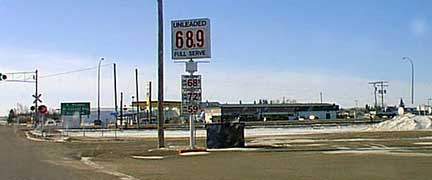 was humming
along on half
was humming
along on half of the fuel that had been needed only a decade earlier.
That lesson was a hard one for oil producers to digest and the wild speculation and breakneck exploration and development spurred onward by the created shortage of the 70s saw the development of high cost sources world wide that when brought into production created an oversupply and to add to their misery these new sources were much more expensive to
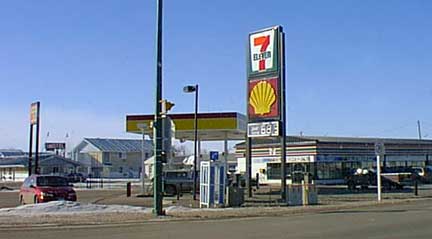 develop
and use as sources.
develop
and use as sources. The gradual decline in demand when compared with the accelerated rate of productivity produced only this past summer oil hitting its lowest price(when inflation is considered) ever, at less then twelve dollars a barrel. Many of those barrels are being produced from fields where the break even point is between twenty and twenty-five.
To get themselves back into a more comfortable situation the oil producers have restricted production and subsequently been able to punt the per barrel price up
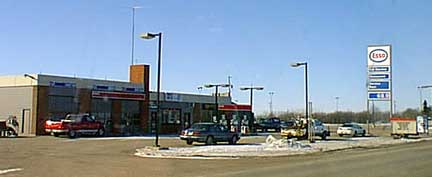 to and over
the thirty dollar
to and over
the thirty dollar mark. Those marginal
oil fields that have been shut down for a decade can be economically turned on and more costly heavy crude and tar sands production once more become economically viable.
However, the price of fuel at the pumps never reflected even remotely the refinery per barrel price when it was less then twelve dollars and now at over thirty, the pump price is still completely arbitrary. The oil companies are faced with some interesting problems, they have to test the economy and see just what price the consumer is willing to pay before he or she parks that fuel guzzling pickup or SUV and starts shopping for fuel miser vehicles. The oil producing countries are seriously concerned that their response to seventies will occur once again and that will not be good for business and you can bet that $1.50US per gallon South of the border and something around seventy cents per litre in Canada, will be the breaking point. If they exceed that for very long the market place will change and there will be a lot of heavy metal on the used car lots and light weight fuel efficient vehicles will become the norm.
In 1973 our new car got a respectable twenty miles to the Canadian gallon with its dual exhaust, four barrel carburetor, 350 cubic inch V-8 it was forty-six hundred pounds of metal on one hundred and twenty-three inch wheel base. Our car today averages 50% better fuel efficiency, has the same power to weight ratio because of its light weight and has the same accessories as the 73 monster. OPEC designed the whole fleet of present cars on the market and their low prices this last few years have spawned the SUV, Van, Pickup revolution that has seen 40% of all vehicles on the road, these more expensive, heavier and less fuel efficient machines. The trend toward the big vehicle has even effected economy vehicles like Ford's Focus and the Toyota Echo that have increased their vehicle's over all height to match the above road visibility in a van or SUV.
So the bottom line is this, gasoline prices will temporarily float around until the oil companies can figure out what the market will bear and not upset a good thing. They want better per barrel pricing on crude to make those marginal fields able to return on the investment in drilling platforms and wilderness pipelines but at the same time they do not want to see millions of thirty mile per gallon vehicles disappear and be replaced by 80 miles per gallon machines and all three major auto makers in North America and the other world car makers have working prototypes and even production models that will achieve this kind of economy.
Quite simply EXXON and Royal Dutch Shell can not afford to make the owners of Suburbans, Expeditions, Jeeps and Renegades upset and before you have to mow the lawn, the price of fuel should be stable at its present level or slightly lower.